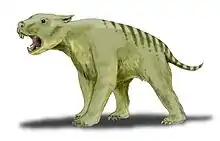Diprotodontidae
The Diprotodontidae are an extinct family of large marsupials, endemic to what would be Australia, during the Oligocene through Pleistocene periods from 28.4 million to 11,000 years ago.[1] Also referred to as giant wombats, the family includes the largest marsupial that ever lived, the enormous wombat-like Diprotodon.[2]
| Diprotodontidae | |
|---|---|
.jpg.webp) | |
| Restoration of Diprotodon | |
| Scientific classification | |
| Kingdom: | Animalia |
| Phylum: | Chordata |
| Class: | Mammalia |
| Infraclass: | Marsupialia |
| Order: | Diprotodontia |
| Superfamily: | †Diprotodontoidea |
| Family: | †Diprotodontidae Gill, 1872 |
| Subfamilies & genera | |
|
Alkwertatherium | |
References
- PaleoBiology Database: Diprotodontidae, basic info
- Price, Gilbert J.; Ferguson, Kyle J.; Webb, Gregory E.; Feng, Yue-xing; Higgins, Pennilyn; Nguyen, Ai Duc; Zhao, Jian-xin; Joannes-Boyau, Renaud; Louys, Julien (2017-09-27). "Seasonal migration of marsupial megafauna in Pleistocene Sahul (Australia–New Guinea)". Proc. R. Soc. B. 284 (1863): 20170785. doi:10.1098/rspb.2017.0785. ISSN 0962-8452. PMC 5627191. PMID 28954903.
- Vertebrate Palaeontology by Michael J. Benton (page 314)
- Wildlife of Gondwana: Dinosaurs and Other Vertebrates from the Ancient Supercontinent (Life of the Past) by Pat Vickers Rich, Thomas Hewitt Rich, Francesco Coffa, and Steven Morton
- Prehistoric Mammals of Australia and New Guinea: One Hundred Million Years of Evolution by John A. Long, Michael Archer, Timothy Flannery, and Suzanne Hand (page 77)
This article is issued from Wikipedia. The text is licensed under Creative Commons - Attribution - Sharealike. Additional terms may apply for the media files.
